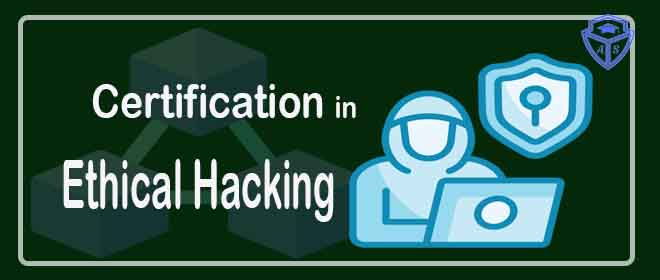
Certification in Ethical Hacking
Updated On 17 Apr,2025

Ethical hacking is a rapidly growing field that focuses on identifying and fixing cybersecurity vulnerabilities before malicious hackers can exploit them. A Certification in Ethical Hacking equips professionals with the skills to safeguard digital infrastructure, conduct penetration testing, and secure networks against cyber threats. Pursuing a cybersecurity certification like this can significantly boost your career prospects.
Why Choose a Certification in Ethical Hacking?
|
Benefits |
Details |
|
High Demand |
Cybersecurity threats are increasing, creating a need for ethical hackers. |
|
Global Career Scope |
Opportunities in IT security, finance, government agencies, and MNCs. |
|
Lucrative Salaries |
Ethical hackers earn competitive salaries worldwide. |
|
Exciting Career Path |
Work on penetration testing, network security, and digital forensics. |
Eligibility Criteria for Ethical Hacking Certification
Educational Requirements
· No strict prerequisites for beginner-level certifications.
· A background in computer science, IT, or cybersecurity is beneficial.
· Knowledge of networking, operating systems, and programming is helpful for ethical hacking courses.
Age Limit
· Generally, no age restrictions.
· Some certifications require candidates to be at least 18 years old.
Top Ethical Hacking Certifications
|
Certification |
Offered By |
Level |
Focus Area |
|
Certified Ethical Hacker (CEH) |
EC-Council |
Intermediate |
Penetration testing, security threats. |
|
Offensive Security Certified Professional (OSCP) |
Offensive Security |
Advanced |
Hands-on penetration testing. |
|
Certified Information Systems Security Professional (CISSP) |
(ISC)² |
Expert |
Security architecture, risk management. |
|
GIAC Penetration Tester (GPEN) |
GIAC |
Intermediate |
Ethical hacking and network penetration. |
|
CompTIA Security+ |
CompTIA |
Beginner |
Security fundamentals, cryptography. |
Top Institutes Offering Ethical Hacking Courses
|
Category |
Institutes |
|
International |
EC-Council, Offensive Security, (ISC)², GIAC |
|
India |
Indian School of Ethical Hacking, IITs (Short-term Courses), NIIT, Simplilearn |
|
Online |
Coursera, Udemy, Cybrary, Pluralsight |
These institutes offer various penetration testing certification and cybersecurity certification programs that suit different career levels.
Top 5 Institutions for Ethical Hacking Certifications Worldwide
- EC-Council – USA – https://www.eccouncil.org
- Offensive Security – USA – https://www.offensive-security.com
- SANS Institute – USA – https://www.sans.org
- CompTIA – USA – https://www.comptia.org
- Cisco – USA – https://www.cisco.com
Obtaining a Certification in Ethical Hacking from these institutes adds immense value to your profile.
Key Skills Learned in Ethical Hacking
|
Skill |
Focus Area |
|
Penetration Testing |
Identifying and exploiting vulnerabilities. |
|
Network Security |
Protecting systems from cyber threats. |
|
Cryptography |
Implementing encryption and security protocols. |
|
Malware Analysis |
Understanding viruses, ransomware, and spyware. |
|
Social Engineering |
Recognizing and mitigating human-based attacks. |
Career Opportunities in Ethical Hacking
Top Hiring Companies
|
Category |
Companies |
|
Tech Firms |
Google, Microsoft, IBM, Cisco |
|
Cybersecurity Companies |
FireEye, Symantec, McAfee, Palo Alto Networks |
|
Financial Sector |
JPMorgan, HSBC, Mastercard, PayPal |
|
Government & Defense |
NSA, CERT-In, DRDO, CBI |
Job Roles & Average Salaries
|
Job Role |
Average Salary (INR LPA) |
|
Ethical Hacker |
₹7-25 LPA |
|
Penetration Tester |
₹8-20 LPA |
|
Security Analyst |
₹6-18 LPA |
|
Cybersecurity Consultant |
₹10-30 LPA |
|
Incident Response Analyst |
₹7-22 LPA |
How to Get Certified in Ethical Hacking?
Step-by-Step Guide
✅ Choose the Right Certification – CEH, OSCP, CISSP, etc.
✅ Enroll in a Training Program – Online or offline courses.
✅ Study Cybersecurity Fundamentals – Networking, Linux, Windows, and scripting.
✅ Practice Ethical Hacking – Hands-on labs and penetration testing.
✅ Pass the Exam – Obtain certification and start applying for jobs.
Scholarships & Financial Aid
|
Scholarship |
Eligibility |
Coverage |
|
EC-Council Scholarship |
Women in cybersecurity |
CEH certification fee discount |
|
Google Cybersecurity Scholarship |
Students in security-related fields |
Course fees + mentorship |
|
CompTIA Security+ Training Grants |
Beginners in cybersecurity |
Exam vouchers + training |
Future Scope of Ethical Hacking
|
Technology |
Industry Application |
|
AI in Cybersecurity |
Automated threat detection, risk assessment. |
|
Cloud Security |
Protecting cloud infrastructures from cyberattacks. |
|
IoT Security |
Securing connected devices and smart systems. |
|
Blockchain & Cybersecurity |
Enhancing security with decentralized networks. |
Projected Growth in Cybersecurity Industry (2025-2035)
· The cybersecurity market is expected to reach $500 billion by 2030.
· Rising demand for ethical hackers, penetration testers, and security analysts.
· Increasing cybersecurity threats leading to more job opportunities globally.
FAQs about Certification in Ethical Hacking
1. Do I need a degree to become an ethical hacker?
No, but a degree in computer science, IT, or cybersecurity can be helpful.
2. Which is the best ethical hacking certification?
The Certified Ethical Hacker (CEH) and OSCP are among the most recognized certifications.
3. What skills are required for ethical hacking?
Networking, Linux, penetration testing, cryptography, and social engineering.
4. What is the salary of a certified ethical hacker?
Entry-level salaries start at ₹6-10 LPA, while experienced professionals earn ₹15-30 LPA.
5. Is ethical hacking legal?
Yes, ethical hacking is legal if done with proper authorization and for security purposes.
Final Thoughts
A Certification in Ethical Hacking is a gateway to a rewarding career in cybersecurity. With rising cyber threats, organizations are in constant need of skilled ethical hackers. Whether you're a beginner or an IT professional, getting certified can open doors to high-paying jobs and exciting opportunities in cybersecurity.
For admission updates, career advice, and guidance, stay connected with Admission Solver!